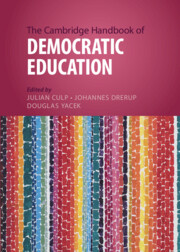Book contents
- The Cambridge Handbook of Democratic Education
- Cambridge Handbooks in Education
- The Cambridge Handbook of Democratic Education
- Copyright page
- Contents
- Contributors
- Acknowledgments
- Introduction
- Part One Historical Perspectives
- Part Two Philosophical and Normative Foundations
- Part Three Key Topics and Concepts
- Part Four Challenges
- 26 Wealth Stratification in US Higher Education and Democratic Education, 1890s–2020s
- 27 Mentoring and Instructional Duties of Professors
- 28 Racism, Moral Transformation, and Democratic Education
- 29 Postcolonial Perspectives on Democratic Education
- 30 Populist Challenges to Democratic Education
- 31 Religion and Democratic Education
- 32 The Epistocratic Challenge to Democratic Education
- 33 Climate Change and Democratic Education
- 34 The COVID-19 Pandemic and Democratic Education
- 35 Teacher Neutrality, Pedagogical Impartiality, and Democratic Education
- Index
- References
35 - Teacher Neutrality, Pedagogical Impartiality, and Democratic Education
from Part Four - Challenges
Published online by Cambridge University Press: 20 April 2023
- The Cambridge Handbook of Democratic Education
- Cambridge Handbooks in Education
- The Cambridge Handbook of Democratic Education
- Copyright page
- Contents
- Contributors
- Acknowledgments
- Introduction
- Part One Historical Perspectives
- Part Two Philosophical and Normative Foundations
- Part Three Key Topics and Concepts
- Part Four Challenges
- 26 Wealth Stratification in US Higher Education and Democratic Education, 1890s–2020s
- 27 Mentoring and Instructional Duties of Professors
- 28 Racism, Moral Transformation, and Democratic Education
- 29 Postcolonial Perspectives on Democratic Education
- 30 Populist Challenges to Democratic Education
- 31 Religion and Democratic Education
- 32 The Epistocratic Challenge to Democratic Education
- 33 Climate Change and Democratic Education
- 34 The COVID-19 Pandemic and Democratic Education
- 35 Teacher Neutrality, Pedagogical Impartiality, and Democratic Education
- Index
- References
Summary
When teachers address controversial issues with their students in class, parents, society, and the teaching profession often expect them to adopt a neutral or impartial pedagogical stance. However, scholars have expressed doubts about whether this duty of impartiality is realistic and questioned whether it is educationally desirable. This chapter defends the duty of impartiality by arguing that the key reservations voiced against it in the academic literature are based on different misconceptions about impartial teaching and teacher neutrality: about the meaning of “controversial issue,” about the educational value of being flexible about neutrality in teaching situations, and about what constitutes a reasonable standard of impartiality. Drawing on the legal concept of evenhandedness, the chapter concludes by putting forward an alternative standard of teacher impartiality that walks the line between the inevitably value-laden nature of teaching and the expectation that teachers exercise their authority in a reasonable and responsible way.
Keywords
- Type
- Chapter
- Information
- The Cambridge Handbook of Democratic Education , pp. 607 - 627Publisher: Cambridge University PressPrint publication year: 2023



